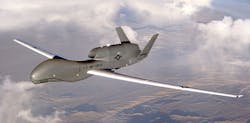Air Force asks Northrop Grumman to stiffen Global Hawk UAV defenses against cyber attacks
Officials of the Air Force Life Cycle Management Center at Wright-Patterson Air Force Base, Ohio, are awarding a $33.9 million contract modification to the Northrop Grumman Aerospace Systems segment in San Diego to retrofit satellite communications links in the Global Hawk UAV fleet.
The contract modification calls for Northrop Grumman to upgrade communications security in International Maritime Satellite links to enable Global Hawk UAVs to improve their defenses against cyber attack.
Related: Air Force orders three Block 30M RQ-4B Global Hawk UAVs for high-altitude surveillance
Global Hawk, which can fly for more than 24 hours between refuelings, often relies on maritime satellite communications (SATCOM) links to enable ground controllers to maintain contact with the unmanned aircraft. The Air Force operates more than 40 Global Hawk unmanned aircraft.
Air Force officials want to stiffen the Global Hawk's maritime SATCOM links to prevent computer hackers from breaking through existing data security to take unauthorized control of the long-endurance, high-altitude Global Hawk reconnaissance UAVs.
Recent studies have uncovered some flaws in satellite communications links that could enable cyber warfare attacks to disrupt military operations and ship and aircraft communications.
Related: Curtiss-Wright to upgrade flight-control computer for variations of Global Hawk UAV
Global Hawk is a high-altitude, long-endurance (HALE) UAV that provides near-real-time intelligence, surveillance and reconnaissance (ISR) over large areas. The Block 30 Global Hawk carries sophisticated imaging and electronic signals sensors on missions that can exceed 32 hours.
Under terms of the contract, Northrop Grumman will make maritime SATCOM security upgrades to Global Hawk unmanned aircraft, as well as to Global Hawk ground-control systems and spare parts.
Northrop Grumman will do the work in Palmdale, Calif., and should be finished by the end of 2016. For more information contact Northrop Grumman Aerospace Systems online at www.northropgrumman.com, or the Air Force Life Cycle Management Center at www.wpafb.af.mil/aflcmc.
